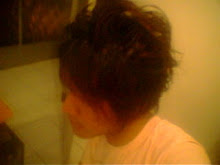If I had the day off tomorrow, I would go to the beavh.
2. If I (have) a million dollars right now, I would retire.
If I had a million dollars rigth now, I would retire.
3. If I (be) the mayor of this city, I would change certain things.
If I were the mayor of this city, I would change certain things.
4. If that man (work) harder, he could earn more money.
If that man worked harder, he could earn more money.
5. I would gladly tell you the answer, if I only (know) it myself.
I would gladly tell you the answer, if I only knew it myself.
6. If Don and I (have) enough money, we would buy a house.
If Don and I had enough money, we would buy a house.
7. If the weather (be) better right now, we could go for a walk.
If the weather were better right now, we could go for a walk.
8. That student would get much higher marks if he (study) harder.
That student would get much higher marks if he studyed harder.
9. If Mr. Smith (call) me, I would explain everything to him.
If Mr. Smith called me, I would explain everything to him.
10. Mr Moore would give up teaching if he (enjoy, not) it so much.
Mr. Moore would give up teaching if he not enjoyed it so much.
11. If I (be) in your place, I would accept Mr. Anderson’s offer.
If I were in your place, I would accept Mr. Anderson’s offer.
12. Poeple would understand you better if you (speak) more carefully.
Poeple would understand you better if you spoke more carefully.
Unreal Conditions : Past
1. If George (have) the money, he would have lent it to me.If George had had the money, he would have lent it to me.
2. I would have spoken to Frank if I (see) him yesterday.
I would have spoken to Frank if I had seem him yesterday.
3. If the weather (be) better, we would have left Friday morning.
If the weather had been better, we would have left Friday morning.
4. Alice would have told you the truth if you (ask) her about it.
Alice would have told you the truth if you had asked her about it.
5. If you (study) a little harder, you would have passed the test.
If you had studyed a little harder, you would have passed the test.
6. I could have lent you some money if I (spend, not) everything.
I could have lent you some money if I hadn’t spent everything.
7. If three (be) any complaints, we would have heard about them.
If three had been any complaints, we would have heard about them.
8. We would have gone with Fred last Friday if he (invite) us.
We would have gone with Fred last Friday if he had invited us.
9. If you (ask, only) me, I could easily have given you the answer.
If you only had asked me, I could easily have given you the answer.
10. Bill would have taken more photographs if he (had) more film.
Bill would have taken more photographs if he had had more film.
11. If Tom (be) here yesterday, he would have been able to advise us.
If Tom had been here yesterday, he would have been able to advise us.
12. We would have bought that house if the price (be) a little lower.
We would have bought that house if the price had been a little lower.
13. If they (need) any help with the work, they would have called us.
If they had needed any help with the work, they would have called us.
